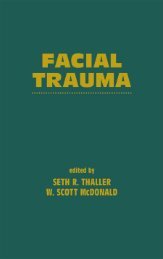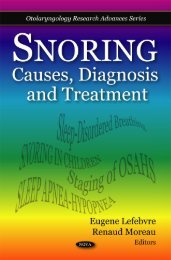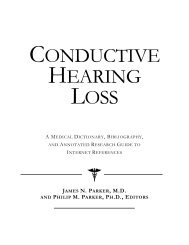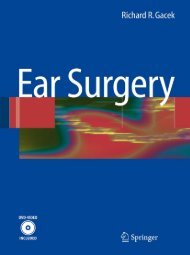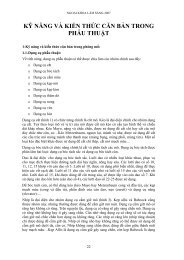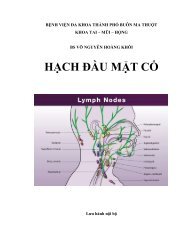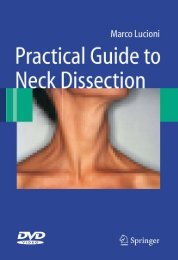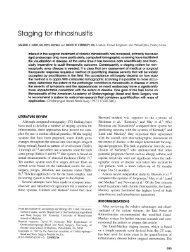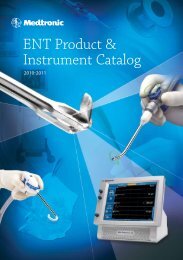Familial Nasopharyngeal Carcinoma 6
Familial Nasopharyngeal Carcinoma 6
Familial Nasopharyngeal Carcinoma 6
- No tags were found...
You also want an ePaper? Increase the reach of your titles
YUMPU automatically turns print PDFs into web optimized ePapers that Google loves.
Prognostic Factors in <strong>Nasopharyngeal</strong> Cancer 133Lee SW, Cho KJ, Park JH, Kim SY, Nam SY, Lee BJ, Kim SB, ChoiSH, Kim JH, Ahn SD, Shin SS, Choi EK, Yu E (2005)Expressions of Ku70 and DNA-PKcs as prognostic indicatorsof local control in nasopharyngeal carcinoma. IntJ Radiat Oncol Biol Phys 62:1451–1457Leon SA, Shapiro B, Sklaroff DM, Yaros MJ (1977) Free DNA inthe serum of cancer patients and the effect of therapy.Cancer Res 37:646–650Leung SF, Chan AT, Zee B, Ma BB, Chan LY, Johnson PJ, Lo YM(2003) Pretherapy quantitative measurement of circulatingEpstein–Barr virus DNA is predictive of posttherapy distantfailure in patients with early-stage nasopharyngealcarcinoma of undifferentiated type. Cancer 98:288–291Leung SF, Zee B, Ma BB, Hui EP, Mo F, Lai M, Chan KC, Chan LY,Kwan W, Lo YM, Chan AT (2006) Plasma Epstein–Barr viraldeoxyribonucleic acid quantitation complements tumornode-metastasisstaging prognostication in nasopharyngealcarcinoma. J Clin Oncol 24:5414–5418Leung TW, Tung SY, Sze WK, Wong FC, Yuen KK, Lui CM, LoSH, Ng TY, SK O (2005) Treatment results of 1070 patientswith nasopharyngeal carcinoma: an analysis of survivaland failure patterns. Head Neck 27:555–565Leung TW, Wong VY, Sze WK, Lui CM, Tung SY (2008) Highdose-rateintracavitary brachytherapy boost for early Tstage nasopharyngeal carcinoma. Int J Radiat Oncol BiolPhys 70:361–367Levendag PC, Schmitz PI, Jansen PP, Eijkenboom WM, VisserAG, Kolkman-Deurloo IK, Sipkema D, Visch LL, Senan S(1998) Fractionated high-dose-rate brachytherapy in primarycarcinoma of the nasopharynx. J Clin Oncol 16:2213–2220Levine PH, Connelly RR, Easton JM (1980) Demographic patternsfor nasopharyngeal carcinoma in the United States.Int J Cancer 26:741–748Liao WT, Song LB, Zhang HZ, Zhang X, Zhang L, Liu WL, FengY, Guo BH, Mai HQ, Cao SM, Li MZ, Qin HD, Zeng YX, ZengMS (2007) Centromere protein H is a novel prognosticmarker for nasopharyngeal carcinoma progression andoverall patient survival. Clin Cancer Res 13:508–514Liaw CC, Wang CH, Huang JS, Kiu MC, Chen JS, Chang HK(1997) Serum lactate dehydrogenase level in patients withnasopharyngeal carcinoma. Acta Oncol 36:159–164Lin JC, Chen KY, Jan JS, Hsu CY (1996) Partially hyperfractionatedaccelerated radiotherapy and concurrent chemotherapyfor advanced nasopharyngeal carcinoma. Int J RadiatOncol Biol Phys 36:1127–1136Lin JC, Chen KY, Wang WY, Jan JS, Liang WM, Tsai CS, Wei YH(2001) Detection of Epstein–Barr virus DNA in the peripheral-bloodcells of patients with nasopharyngeal carcinoma:relationship to distant metastasis and survival.J Clin Oncol 19:2607–2615Lin JC, Chen KY, Wang WY, Jan JS, Liang WM, Wei YH (2002)Evaluation of cytokeratin-19 mRNA as a tumor marker inthe peripheral blood of nasopharyngeal carcinoma patientsreceiving concurrent chemoradiotherapy. Int J Cancer 97:548–553Lin JC, Jan JS, Hsu CY, Jiang RS, Wang WY (2003a) Outpatientweekly neoadjuvant chemotherapy followed by radiotherapyfor advanced nasopharyngeal carcinoma: high completeresponse and low toxicity rates. Br J Cancer 88:187–194Lin JC, Jan JS, Hsu CY, Liang WM, Jiang RS, Wang WY (2003b)Phase III study of concurrent chemoradiotherapy versusradiotherapy alone for advanced nasopharyngeal carcinoma:positive effect on overall and progression-free survival.J Clin Oncol 21:631–637Lin JC, Wang WY, Chen KY, Wei YH, Liang WM, Jan JS, Jiang RS(2004) Quantification of plasma Epstein–Barr virus DNAin patients with advanced nasopharyngeal carcinoma. NewEngl J Med 350:2461–2470Lin JC, Wang WY, Liang WM, Chou HY, Jan JS, Jiang RS, Wang JY,Twu CW, Liang KL, Chao J, Shen WC (2007) Long-term prognosticeffects of plasma Epstein–Barr Virus DNA by minorgroove binder-probe real-time quantitative PCR on nasopharyngealcarcinoma patients receiving concurrent chemoradiotherapy.Int J Radiat Oncol Biol Phys 68:1342–1348Liu MY, Chang YL, Ma J, Yang HL, Hsu MM, Chen CJ, Chen JY,Yang CS (1997) Evaluation of multiple antibodies toEpstein–Barr virus as markers for detecting patients withnasopharyngeal carcinoma. J Med Virol 52:262–269Liu MZ, Tang LL, Zong JF, Huang Y, Sun Y, Mao YP, Liu LZ, LinAH, Ma J (2008) Evaluation of sixth edition of AJCC stagingsystem for nasopharyngeal carcinoma and proposedimprovement. Int J Radiat Oncol Biol Phys 70:1115–1123Liu LZ, Zhang GY, Xie CM, Liu XW, Cui CY, Li L (2006) Magneticresonance imaging of retropharyngeal lymph node metastasisin nasopharyngeal carcinoma: patterns of spread. IntJ Radiat Oncol Biol Phys 66:721–730Lo KW, To KF, Huang DP (2004) Focus on nasopharyngeal carcinoma.Cancer Cell 5:423–428Lo YM, Chan LY, Lo KW, Leung SF, Zhang J, Chan AT, Lee JC,Hjelm NM, Johnson PJ, Huang DP (1999a) Quantitativeanalysis of cell-free Epstein–Barr virus DNA in plasma ofpatients with nasopharyngeal carcinoma. Cancer Res 59:1188–1191Lo YM, Chan LY, Chan AT, Leung SF, Lo KW, Zhang J, Lee JC,Hjelm NM, Johnson PJ, Huang DP (1999b) Quantitativeand temporal correlation between circulating cell-freeEpstein–Barr virus DNA and tumor recurrence in nasopharyngealcarcinoma. Cancer Res 59:5452–5455Lo YM, Chan AT, Chan LY, Leung SF, Lam CW, Huang DP,Johnson PJ (2000a) Molecular prognostication of nasopharyngealcarcinoma by quantitative analysis of circulatingEpstein–Barr virus DNA. Cancer Res 60:6878–6881Lo YM, Leung SF, Chan LY, Chan AT, Lo KW, Johnson PJ, HuangDP (2000b) Kinetics of plasma Epstein–Barr virus DNAduring radiation therapy for nasopharyngeal carcinoma.Cancer Res 60:2351–2355Lo YM, Leung SF, Chan LY, Lo KW, Zhang J, Chan AT, Lee JC,Hjelm NM, Johnson PJ, Huang DP (2000c) Plasma cell-freeEpstein–Barr virus DNA quantitation in patients withnasopharyngeal carcinoma. Correlation with clinical staging.Ann NY Acad Sci 906:99–101Lu JC, Wei BQ, Chen WZ, Qian PD, Zhang YQ, Wei Q, Cha WW,Li F, Ni M (2006) Staging of nasopharyngeal carcinomainvestigated by magnetic resonance imaging. RadiotherOncol 79:21–26Lu JC, Wei Q, Zhang YQ, Li F (2004) Influence of MRI abnormalityin skull base bone on prognosis of nasopharyngealcarcinoma. Cancer Radiother 8:230–233Ma BB, Poon TC, To KF, Zee B, Mo FK, Chan CM, Ho S, Teo PM,Johnson PJ, Chan AT (2003) Prognostic significance oftumor angiogenesis, Ki 67, p53 oncoprotein, epidermalgrowth factor receptor and HER2 receptor protein expressionin undifferentiated nasopharyngeal carcinoma – aprospective study. Head Neck 25:864–872



